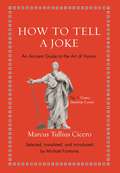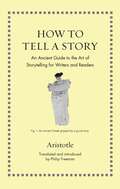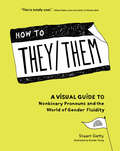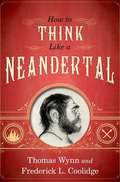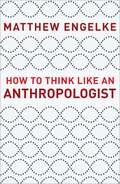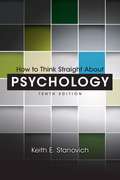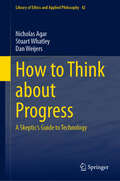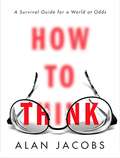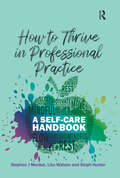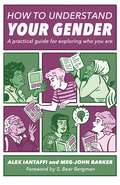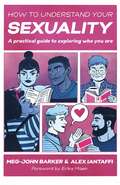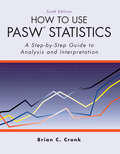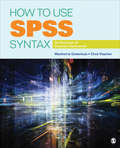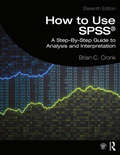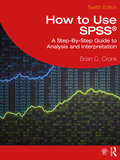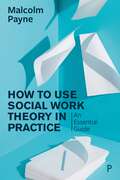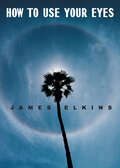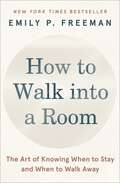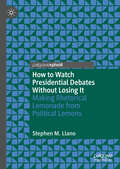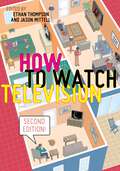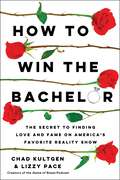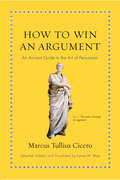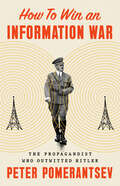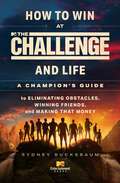- Table View
- List View
How to Tell a Joke: An Ancient Guide to the Art of Humor (Ancient Wisdom for Modern Readers)
by Marcus Tullius CiceroTimeless advice about how to use humor to win over any audienceCan jokes win a hostile room, a hopeless argument, or even an election? You bet they can, according to Cicero, and he knew what he was talking about. One of Rome’s greatest politicians, speakers, and lawyers, Cicero was also reputedly one of antiquity’s funniest people. After he was elected commander-in-chief and head of state, his enemies even started calling him “the stand-up Consul.” How to Tell a Joke provides a lively new translation of Cicero’s essential writing on humor alongside that of the later Roman orator and educator Quintilian. The result is a timeless practical guide to how a well-timed joke can win over any audience.As powerful as jokes can be, they are also hugely risky. The line between a witty joke and an offensive one isn’t always clear. Cross it and you’ll look like a clown, or worse. Here, Cicero and Quintilian explore every aspect of telling jokes—while avoiding costly mistakes. Presenting the sections on humor in Cicero’s On the Ideal Orator and Quintilian’s The Education of the Orator, complete with an enlightening introduction and the original Latin on facing pages, How to Tell a Joke examines the risks and rewards of humor and analyzes basic types that readers can use to write their own jokes.Filled with insight, wit, and examples, including more than a few lawyer jokes, How to Tell a Joke will appeal to anyone interested in humor or the art of public speaking.
How to Tell a Story: An Ancient Guide to the Art of Storytelling for Writers and Readers (Ancient Wisdom for Modern Readers)
by AristotleAn inviting and highly readable new translation of Aristotle’s complete Poetics—the first and best introduction to the art of writing and understanding storiesAristotle’s Poetics is the most important book ever written for writers and readers of stories—whether novels, short fiction, plays, screenplays, or nonfiction. Aristotle was the first to identify the keys to plot, character, audience perception, tragic pleasure, and dozens of other critical points of good storytelling. Despite being written more than 2,000 years ago, the Poetics remains essential reading for anyone who wants to learn how to write a captivating story—or understand how such stories work and achieve their psychological effects. Yet for all its influence, the Poetics is too little read because it comes down to us in a form that is often difficult to follow, and even the best translations are geared more to specialists than to general readers who simply want to grasp Aristotle’s profound and practical insights. In How to Tell a Story, Philip Freeman presents the most readable translation of the Poetics yet produced, making this indispensable handbook more accessible, engaging, and useful than ever before.In addition to its inviting and reliable translation, a commentary on each section, and the original Greek on facing pages, this edition of the Poetics features unique bullet points, chapter headings, and section numbers to help guide readers through Aristotle’s unmatched introduction to the art of writing and reading stories.
How to They/Them: A Visual Guide to Nonbinary Pronouns and the World of Gender Fluidity
by Stuart Getty&“This tender, smart, personal book is a gift. Stuart Getty generously shows us, with witty illustrations and kind humor, the hows and whys of they/them pronouns. A wonderful and necessary resource that is a delight to read.&”—Michelle Tea, author of Modern Tarot and ValenciaWhat does nonbinary really mean? What is gender nonconforming? And isn't they a plural pronoun? In this charming and disarming guide, a real-life they-using genderqueer writer unpacks all your burning questions in a fun, visual way. No soapboxes or divisive comment-section wars here!Sometimes funny, sometimes serious, always human, this gender-friendly primer will get you up to speed. It's about more than just bathrooms and pronouns--this is about gender expression and the freedom to choose how to identify. While they might only be for some, that freedom is for everyone!&“[A] clear, kind guide to gender nonconformity. Getty's cheeky tone and the punchy black-and-white illustrations by Brooke Thyng make this book a useful reference for anyone with questions about gender, whether their own or those they witness in the larger world.&”—Booklist&“Straightforward, practical, relevant navigation through the radiant world of gender fluidity.&”—Kirkus Reviews
How to Think Like a Neandertal
by Thomas Wynn Frederick L. CoolidgeThere have been many books, movies, and even TV commercials featuring Neandertals - some serious, some comical. But what was it really like to be a Neandertal? How were their lives similar to or different from ours? In How to Think Like a Neandertal, archaeologist Thomas Wynn and psychologist Frederick L. Coolidge team up to provide a brilliant account of the mental life of Neandertals, drawing on the most recent fossil and archaeological remains. Indeed, some Neandertal remains are not fossilized, allowing scientists to recover samples of their genes - one specimen had the gene for red hair and, more provocatively, all had a gene called FOXP2, which is thought to be related to speech. Given the differences between their faces and ours, their voices probably sounded a bit different, and the range of consonants and vowels they could generate might have been different. But they could talk, and they had a large (perhaps huge) vocabulary - words for places, routes, techniques, individuals, and emotions. Extensive archaeological remains of stone tools and living sites (and, yes, they did often live in caves) indicate that Neandertals relied on complex technical procedures and spent most of their lives in small family groups. The authors sift the evidence that Neandertals had a symbolic culture - looking at their treatment of corpses, the use of fire, and possible body coloring - and conclude that they probably did not have a sense of the supernatural. The book explores the brutal nature of their lives, especially in northwestern Europe, where men and women with spears hunted together for mammoths and wooly rhinoceroses. They were pain tolerant, very likely taciturn, and not easy to excite. Wynn and Coolidge offer here an eye-opening portrait of Neandertals, painting a remarkable picture of these long-vanished people and providing insight, as they go along, into our own minds and culture.
How to Think Like an Anthropologist
by Matthew EngelkeFrom an award-winning anthropologist, a lively accessible, and at times irreverent introduction to the subjectWhat is anthropology? What can it tell us about the world? Why, in short, does it matter? For well over a century, cultural anthropologists have circled the globe, from Papua New Guinea to suburban England and from China to California, uncovering surprising facts and insights about how humans organize their lives and articulate their values. In the process, anthropology has done more than any other discipline to reveal what culture means--and why it matters. By weaving together examples and theories from around the world, Matthew Engelke provides a lively, accessible, and at times irreverent introduction to anthropology, covering a wide range of classic and contemporary approaches, subjects, and practitioners. Presenting a set of memorable cases, he encourages readers to think deeply about some of the key concepts with which anthropology tries to make sense of the world—from culture and nature to authority and blood. Along the way, he shows why anthropology matters: not only because it helps us understand other cultures and points of view but also because, in the process, it reveals something about ourselves and our own cultures, too.
How to Think Straight About Psychology (Tenth Edition)
by Keith E. StanovichKeith Stanovich's widely used and highly acclaimed book presents a short introduction to the critical thinking skills that will help students to better understand the subject matter of psychology. How to Think Straight about Psychology, 10e helps students recognize pseudoscience and be able to distinguish it from true psychological research, aiding students to become more discriminating consumers of psychological information.
How to Think about Progress: A Skeptic's Guide to Technology (Library of Ethics and Applied Philosophy #42)
by Nicholas Agar Stuart Whatley Dan WeijersHow to Think about Progress is an interdisciplinary work exploring whether optimistic claims about technology’s potential stand up to humanity’s most difficult challenges. Will technology solve the problems of climate change, pandemics, cancer, loneliness, unhappiness, and even death? The authors show that techno-hype is all too often accepted because of the horizon bias, i.e. the modern propensity to believe that any problem that can be solved with technology will be solved in the very near future. The authors situate their analysis in a broad context, drawing on history, literature, and popular culture to emphasize their case against techno-hype. They also draw on a wide range of research, including that of biologists, philosophers of science and of language, psychologists, theorists of technological change, specialists on digital technologies, historians of ideas, and economists. As a corrective to much mainstream “futurism,” the book offers principles for seeing through much of the techno-hype that circulates online and in best-selling books. The authors share insights (without the jargon) from a variety of academic disciplines, making this book an engaging read for all audiences. Readers will find a balanced framework for thinking and writing about technological progress in the face of truly vexing challenges like cancer, climate change, and colonizing mars.
How to Think: A Survival Guide for a World at Odds
by Alan Jacobs"Absolutely splendid . . . essential for understanding why there is so much bad thinking in political life right now." —David Brooks, New York TimesHow to Think is a contrarian treatise on why we’re not as good at thinking as we assume—but how recovering this lost art can rescue our inner lives from the chaos of modern life. As a celebrated cultural critic and a writer for national publications like The Atlantic and Harper’s, Alan Jacobs has spent his adult life belonging to communities that often clash in America’s culture wars. And in his years of confronting the big issues that divide us—political, social, religious—Jacobs has learned that many of our fiercest disputes occur not because we’re doomed to be divided, but because the people involved simply aren’t thinking. Most of us don’t want to think. Thinking is trouble. Thinking can force us out of familiar, comforting habits, and it can complicate our relationships with like-minded friends. Finally, thinking is slow, and that’s a problem when our habits of consuming information (mostly online) leave us lost in the spin cycle of social media, partisan bickering, and confirmation bias. In this smart, endlessly entertaining book, Jacobs diagnoses the many forces that act on us to prevent thinking—forces that have only worsened in the age of Twitter, “alternative facts,” and information overload—and he also dispels the many myths we hold about what it means to think well. (For example: It’s impossible to “think for yourself.”) Drawing on sources as far-flung as novelist Marilynne Robinson, basketball legend Wilt Chamberlain, British philosopher John Stuart Mill, and Christian theologian C.S. Lewis, Jacobs digs into the nuts and bolts of the cognitive process, offering hope that each of us can reclaim our mental lives from the impediments that plague us all. Because if we can learn to think together, maybe we can learn to live together, too.
How to Thrive in Professional Practice: A Self-care Handbook
by Stephen J Mordue Lisa Watson Steph HunterThis engaging book pulls together the individual strains of self-care, spirituality and common sense. It is a one-stop ‘bible’ to give social workers and other professionals an uncomplicated, easy to read resource that empowers them to manage and maintain their well-being through personal responsibility and self-care. The world today is fast paced and societal expectations for impeccable service are high. We cannot always alter the demands of our professional or personal lives, but by actively pursuing well-being we can enhance skills to support open discussion in supervision (or in personal reflection) so that individuals (and organisations) can successfully rise to meet challenges head on and reduce the risks associated with burnout.Building on the authors’ years of personal experience, this book Brings together everything professionals need for their own self-care through a range of practical activities Gives you tried and tested self-care ideas backed by the latest research Allows you as professionals to take a holistic approach to a range of subjects that people usually explore in isolation.
How to Understand Your Gender: A Practical Guide for Exploring Who You Are
by Alex Iantaffi Meg-John BarkerHave you ever questioned your own gender identity? Do you know somebody who is transgender or who identifies as non-binary? Do you ever feel confused when people talk about gender diversity? This down-to-earth guide is for anybody who wants to know more about gender, from its biology, history and sociology, to how it plays a role in our relationships and interactions with family, friends, partners and strangers. It looks at practical ways people can express their own gender, and will help you to understand people whose gender might be different from your own. With activities and points for reflection throughout, this book will help people of all genders engage with gender diversity and explore the ideas in the book in relation to their own lived experiences.
How to Understand Your Sexuality: A Practical Guide for Exploring Who You Are
by Alex Iantaffi Meg-John BarkerGay, straight, queer, pansexual, demisexual, ace...? Sexuality is complex and diverse, but it doesn't have to be confusing.This down-to-earth guide is the ultimate companion for understanding, accepting and celebrating your sexuality. Written by two internationally renowned authors and therapists, the book explains how sexuality works in terms of our identities, attractions, desires and practices, and explores how it intersects with our personal experiences and the world around us.With activities and reflection points throughout, it offers space to tune into yourself and think deeply about your own sexuality. You'll hear from people across the sexuality spectrum and in different relationship set-ups, and be inspired by the ideas of scholars, activists and practitioners. Sexuality is a vast and wonderful landscape - let this book guide you on your journey!
How to Use Pasw Statistics: A Step-By-Step Guide to Analysis and Interpretation
by Brian. C. Cronk• Designed for use by novice computer users, this text begins with the basics, such as starting SPSS, defining variables, and entering and saving data.• All major statistical techniques covered in beginning statistics classes are included:· descriptive statistics· graphing data· prediction and association· parametric inferential statistics· nonparametric inferential statistics· statistics for test construction• Each section starts with a brief description of the statistic that is covered and important underlying assumptions, which help students select appropriate statistics.• Each section describes how to interpret results and express them in a research report after the data are analyzed. For example, students are shown how to phrase the results of a significant and an insignificant t test.• More than 200 screenshots (including sample output) throughout the book show students exactly what to expect as they follow along using SPSS.• A glossary of statistical terms is included, which makes a handy reference for students who need to review the meanings of basic statistical terms.• Practice exercises throughout the book give students stimulus material to use as they practice to achieve mastery of the program.• Thoroughly field-tested; your students are certain to appreciate this book.
How to Use SPSS Syntax: An Overview of Common Commands
by Chris Visscher Manfred te GrotenhuisRather than focusing on SPSS menus and the graphic user interface, How to Use SPSS Syntax focuses on the syntax rules in SPSS, a more encompassing approach that allows readers to replicate statistical analyses by storing them in a file for future use. Practical, accessible, and highly focused, the book is brief, while still helping readers develop an in-depth understanding of the common syntax rules and commands. In every chapter, the authors clearly explain the syntax, show the main results, and include social science research examples and downloadable files that allow readers to follow along. Checks throughout the book help readers determine whether the syntax is used correctly.
How to Use SPSS Syntax: An Overview of Common Commands
by Chris Visscher Manfred te GrotenhuisRather than focusing on SPSS menus and the graphic user interface, How to Use SPSS Syntax focuses on the syntax rules in SPSS, a more encompassing approach that allows readers to replicate statistical analyses by storing them in a file for future use. Practical, accessible, and highly focused, the book is brief, while still helping readers develop an in-depth understanding of the common syntax rules and commands. In every chapter, the authors clearly explain the syntax, show the main results, and include social science research examples and downloadable files that allow readers to follow along. Checks throughout the book help readers determine whether the syntax is used correctly.
How to Use SPSS®: A Step-By-Step Guide to Analysis and Interpretation
by Brian C. CronkHow to Use SPSS® is designed with the novice computer user in mind and for people who have no previous experience using SPSS. Each chapter is divided into short sections that describe the statistic being used, important underlying assumptions, and how to interpret the results and express them in a research report. The book begins with the basics, such as starting SPSS, defining variables, and entering and saving data. It covers all major statistical techniques typically taught in beginning statistics classes, such as descriptive statistics, graphing data, prediction and association, parametric inferential statistics, nonparametric inferential statistics and statistics for test construction. More than 270 screenshots (including sample output) throughout the book show students exactly what to expect as they follow along using SPSS. The book includes a glossary of statistical terms and practice exercises. A complete set of online resources including video tutorials and output files for students, and PowerPoint slides and test bank questions for instructors, make How to Use SPSS® the definitive, field-tested resource for learning SPSS. New to this edition: Now in full color with additional screenshots Fully updated to the reflect SPSS version 26 (and prior versions) Changes in nonparametric tests Model View incorporated Data and real output are now available for all Phrasing Results sections – eliminating hypothetical output or hypothetical data
How to Use SPSS®: A Step-By-Step Guide to Analysis and Interpretation
by Brian C. CronkHow to Use SPSS® is designed with the novice computer user in mind and for people who have no previous experience using SPSS. Each chapter is divided into short sections that describe the statistic being used, important underlying assumptions, and how to interpret the results and express them in a research report. The book begins with the basics, such as starting SPSS, defining variables, and entering and saving data. It covers all major statistical techniques typically taught in beginning statistics classes, such a descriptive statistics, graphing data, prediction and association, parametric inferential statistics, nonparametric inferential statistics and statistics for test construction. More than 275 screenshots (including sample output) throughout the book show students exactly what to expect as they follow along using SPSS. The book includes a glossary of statistical terms and practice exercises. A complete set of online resources including video tutorials and output files for students, and PowerPoint slides and test bank questions for instructors, make How to Use SPSS® the definitive, field-tested resource for learning SPSS. New to this edition: Fully updated to the reflect SPSS version 29. Every screen shot has been recaptured. New video supplements for all practice exercises. References to significance levels have been updated to reflect the new SPSS output format. Effect size is now shown in output for many procedures and reference to some effect size has been moved from Appendix A to be more integrated into the chapters. Sample results sections now also include effect size where SPSS directly calculates effect size. A new section covering the EXPLORE command has been added to Chapter 3.
How to Use Social Work Theory in Practice: An Essential Guide
by Malcolm PayneSocial work theory is full of ideas about how to practise. It guides you in what to do as well as how to approach and think about social work goals. In this clear and systematic book covering both general practice concepts and theoretical insights, best-selling author Malcolm Payne shows you how to work with the main theories and practice techniques and pinpoint their strengths and limitations. This book: • Explores the social work process from first to last contact; • Covers all the theories and methods you need to know as a practitioner; • Examines practice techniques and the ideas that inform them; • Includes helpful chapter-by-chapter infographics. This practical guide condenses the practical features of social work theory but doesn’t oversimplify them. Students and practitioners can confidently put their knowledge into action and see how everyday practice implements theoretical ideas. It will be an invaluable resource to students and newly qualified practitioners in social work and in related fields of practice, making connections with both classic and contemporary movements in social work
How to Use Your Eyes
by James ElkinsJames Elkins's How to Use Your Eyes invites us to look at--and maybe to see for the first time--the world around us, with breathtaking results. Here are the common artifacts of life, often misunderstood and largely ignored, brought into striking focus. With the discerning eye of a painter and the zeal of a detective, Elkins explores complicated things like mandalas, the periodic table, or a hieroglyph, remaking the world into a treasure box of observations--eccentric, ordinary, marvelous.
How to Walk into a Room: The Art of Knowing When to Stay and When to Walk Away
by Emily P. FreemanIf life were a house, then every room holds a story. What do we do when a room we’re in is no longer a room where we belong?What do you do when you start to feel a shift and must decide if it’s time to make a change? When it comes to navigating big decisions about when to stay and go, how can we know for sure when the time is right? Though we enter and exit many rooms over the course of our life—jobs, relationships, communities, life stages—knowing how and when it’s time to leave is a decision that rarely has a clear answer.Podcast host, spiritual director, and bestselling author of The Next Right Thing, Emily P. Freeman offers guidance to help us recognize when it’s time to move on from situations that no longer fit, allowing us to find new spaces where we can flourish and grow.How to Walk Into a Room helps us begin to uncover the silent, nuanced, and hidden arrows for anyone asking questions like: How do I know if it’s time to move on? What if I stay and nothing changes? What if I leave and everything falls apart?Through thought-provoking questions, spiritual practices, and personal stories, How to Walk into a Room will help you to know and name the caution flags in your current spaces, discern the difference between true peace and discomfort avoidance, navigate endings even when there is no closure, find peace for when you feel ready but it isn’t time, and courage for when it’s time but you don’t feel ready. For anyone standing in a threshold, here’s a book to help discern the how, when, and what now of walking out of rooms and into new ones with peace, confidence, and a whole heart.
How to Watch Presidential Debates Without Losing It: Making Rhetorical Lemonade from Political Lemons
by Stephen M. LlanoThis book offers an answer to the question, "Why are Presidential debates so bad?" The answer could be that the Commission on Presidential Debates ruined them, or it could be that we don't really know how to watch or judge a debate. This book offers both an explanation of how we historically ended up with these terrible debates and how to make lemonade out of them. The book provides a method to watching this madness without going or getting mad yourself, and what perhaps we can say to others about these debates. It concludes with speculation beyond 2024 now that the Commission on Presidential Debates appears to be irrelevant. What types of debate can we expect, and what should we demand?
How to Watch Television, Second Edition (User's Guides to Popular Culture #3)
by Ethan Thompson Jason MittellA new edition that brings the ways we watch and think about television up to the presentWe all have opinions about the television shows we watch, but television criticism is about much more than simply evaluating the merits of a particular show and deeming it “good” or “bad.” Rather, criticism uses the close examination of a television program to explore that program’s cultural significance, creative strategies, and its place in a broader social context.How to Watch Television, Second Edition brings together forty original essays—more than half of which are new to this edition—from today’s leading scholars on television culture, who write about the programs they care (and think) the most about. Each essay focuses on a single television show, demonstrating one way to read the program and, through it, our media culture. From fashioning blackness in Empire to representation in Orange is the New Black and from the role of the reboot in Gilmore Girls to the function of changing political atmospheres in Roseanne, these essays model how to practice media criticism in accessible language, providing critical insights through analysis—suggesting a way of looking at TV that students and interested viewers might emulate. The contributors discuss a wide range of television programs past and present, covering many formats and genres, spanning fiction and non-fiction, broadcast, streaming, and cable. Addressing shows from TV’s earliest days to contemporary online transformations of the medium, How to Watch Television, Second Edition is designed to engender classroom discussion among television critics of all backgrounds.To access additional essays from the first edition, visit the "links" tab at nyupress.org/9781479898817/how-to-watch-television-second-edition/.
How to Win The Bachelor: The Secret to Finding Love and Fame on America's Favorite Reality Show
by Chad Kultgen Lizzy PacePerfect for fans of Bachelor Nation and Seinfeldia, an illuminating deep dive into the most successful reality TV franchise of all time—The Bachelor.Since its premiere in 2002, ABC&’s The Bachelor has become a staple of American television. Now, discover the fascinating history of the show, uncover the ins and outs of the phenomenon that has become Bachelor Nation, and take a deeper look at what separates the winners from the losers. From how best to exit the limo on Night One, to strategies for making a run for the all-important First Impression Rose, to how to avoid being labeled a villain, this clear-eyed guide illustrates the rules and strategies any would-be contestant should know. The ultimate must-read for every fan, How to Win the Bachelor gives you an inside look at the franchise where The Rose holds all the power.
How to Win an Argument: An Ancient Guide to the Art of Persuasion
by Marcus Tullius Cicero James M. MayAll of us are faced countless times with the challenge of persuading others, whether we're trying to win a trivial argument with a friend or convince our coworkers about an important decision. Instead of relying on untrained instinct--and often floundering or failing as a result--we'd win more arguments if we learned the timeless art of verbal persuasion, rhetoric. How to Win an Argument gathers the rhetorical wisdom of Cicero, ancient Rome's greatest orator, from across his works and combines it with passages from his legal and political speeches to show his powerful techniques in action. The result is an enlightening and entertaining practical introduction to the secrets of persuasive speaking and writing--including strategies that are just as effective in today's offices, schools, courts, and political debates as they were in the Roman forum.How to Win an Argument addresses proof based on rational argumentation, character, and emotion; the parts of a speech; the plain, middle, and grand styles; how to persuade no matter what audience or circumstances you face; and more. Cicero's words are presented in lively translations, with illuminating introductions; the book also features a brief biography of Cicero, a glossary, suggestions for further reading, and an appendix of the original Latin texts.Astonishingly relevant, this unique anthology of Cicero's rhetorical and oratorical wisdom will be enjoyed by anyone who ever needs to win arguments and influence people--in other words, all of us.
How to Win an Information War: The Propagandist Who Outwitted Hitler
by Peter PomerantsevFrom one of our leading experts on disinformation, this inventive biography of the rogue WWII propagandist Sefton Delmer confronts hard questions about the nature of information war: what if you can't fight lies with truth? Can a propaganda war ever be won? In the summer of 1941, Hitler ruled Europe from the Atlantic to the Black Sea. Britain was struggling to combat his powerful propaganda machine, crowing victory and smearing his enemies as liars and manipulators over his frequent radio speeches, blasted out on loudspeakers and into homes. British claims that Hitler was dangerous had little impact against this wave of disinformation. Except for the broadcasts of someone called Der Chef, a German who questioned Nazi doctrine. He had access to high-ranking German military secrets and spoke of internal rebellion. His listeners included German soldiers and citizens, as well as politicians in Washington DC who were debating getting into the war. And--most importantly--Der Chef was a fiction. He was a character created by the British propagandist Thomas Sefton Delmer, a unique weapon in the war. Then, as author Peter Pomerantsev seeks to tell Delmer's story, he is called into a wartime propaganda effort of his own: the US response to the invasion of Ukraine. In flashes forward to the present day, Pomerantsev weaves in what he's learning from Delmer as he seeks to fight against Vladimir Putin's tyranny and lies. This book is the story of Delmer and his modern investigator, as they each embark on their own quest to manipulate the passions of supporters and enemies, and to turn the tide of an information war, an extraordinary history that is informing the present before our eyes.
How to Win at The Challenge and Life: A Champion's Guide to Eliminating Obstacles, Winning Friends, and Making That Money
by Sydney BucksbaumYou&’ve seen the rivalries. You&’ve witnessed the blood, sweat, and tears. You&’ve celebrated the champions. But what does it really take to win MTV&’s The Challenge? And what happens after the cameras stop rolling? Since 1998, MTV&’s The Challenge has tested competitors&’ physical, mental, and emotional endurance. Some go on to become Challenge legends, going down in history as players who changed the game forever. But for each champion, there are dozens more who try and fail (over and over again) to earn the title. In her time covering the show, pop culture journalist and Challenge superfan Sydney Bucksbaum has gotten to know many of the champs, gaining an insider&’s knowledge of what goes into making a winning strategy—and how difficult it is to actually pull it off. Here, she profiles twenty-one of the most popular, successful, and infamous champions and reveals not only how they won The Challenge but also how they applied the skills they learned from the experience to their personal lives and careers. From seven-time winner Johnny &“Bananas&” Devenanzio, Challenge &“Godfather&” Mark Long, OG champ Veronica Portillo, elimination beast Emily Schromm to most-improved competitors Cara Maria Sorbello and Chris &“C.T.&” Tamburello, the best in the game look back at their decades of hard work, including the euphoric highs, devastating lows, and everything in between. Eye-opening and inspiring, How to Win at The Challenge and Life is the must-have book for any and all fans looking to level up their own lives—and learn never-before-heard stories from the people who have dominated the show in every way.
